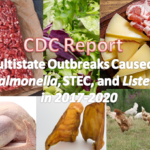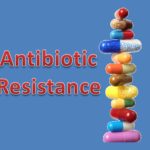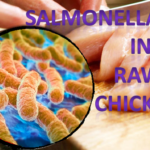The CDC issued a on its investigation of multistate outbreaks between 2017-2020 caused by Salmonella, STEC, and Listeria monocytogenes. The analysis includes 470 possible multistate outbreaks. The investigation showed that 250 (53%) of these were multistate outbreaks, and the investigation solved 199 (80%) of the outbreaks. There was enough information to confirm the source for 134 (67%) outbreaks as solved. The increase in investigated outbreaks, especially between 2018 and 2019, probably resulted from the implementation of whole genome sequencing in PulseNet. The number of investigated outbreaks fell in 2020, probably due to the COVID-19. The 250 multistate outbreaks investigated included...
ruth
ruth
In 2017, the WHO identified a list of bacteria that present a significant threat to human health and require new antibiotics. Bacterial resistance to antibiotics is a critical global public health threat, killing at least 1.27 million people worldwide and associated with nearly 5 million deaths in 2019. In the US, more than 2.8 million antimicrobial-resistant infections occur each year. According to the CDC’s report, more than 35,000 people die as a result. WHO concludes that one of the biggest threats to global health is the lack of new antibiotics. Developing new drugs involves lots of time, effort, scientific research,...
ruth
In 2015, the USDA/FSIS developed a new pathogen reduction standard for Salmonella. The standard for chicken parts permitted 15.4 % positivity; it represents a 30 % reduction in the occurrence of Salmonella-in chicken parts samples. In 2022 the FSIS demonstrated over 75% reduction in Salmonella contamination of chickens and chicken parts. The study found that the intended 25 % reduction of Salmonella contamination was probably achieved for minced turkey, but not for minced chicken. However, the reduction in the presence of Salmonella did not result in a reduction in Salmonella illnesses. Consumer Report (CR) published their own data, they found...
ruth
FSIS issued a report on Foodborne illness outbreaks that may involve FSIS-regulated products. Included are outbreaks that involve four foodborne pathogens: Salmonella, Shiga toxin-producing Escherichia coli (STEC), Listeria monocytogenes (Lm), and Campylobacter. The report summarizes outbreaks that FSIS investigated from October 1, 2020, to September 30, 2021. The COVID-19 pandemic likely decreased the number of reported foodborne illness outbreaks in FY 2021. For the previous three fiscal years, the outbreaks investigated by FSIS were 16 in 2018, 16 in 2019, and 12 in 2020. In the fiscal Year 2021, FSIS investigated nine outbreaks. These outbreaks involved approximately 200 illnesses and...




